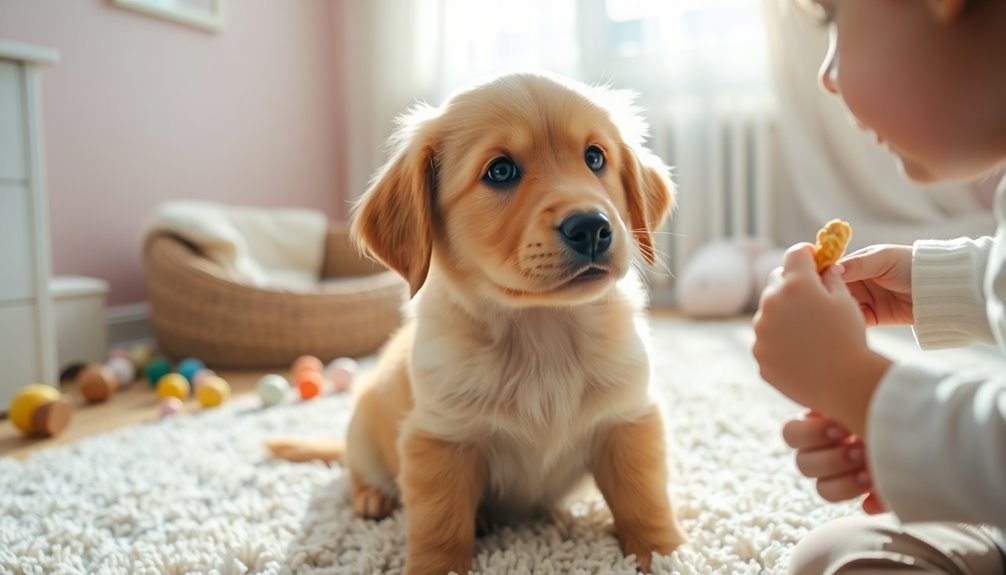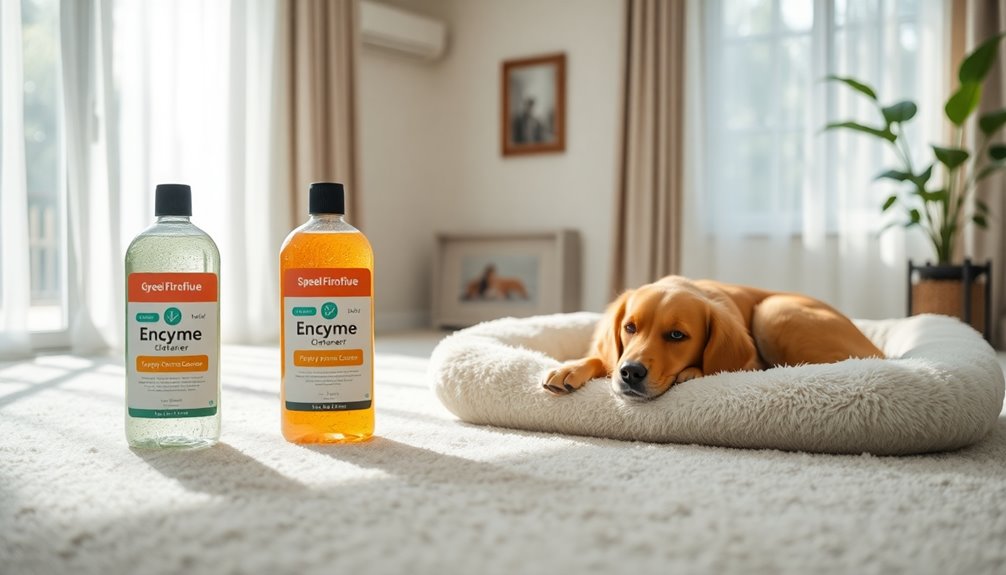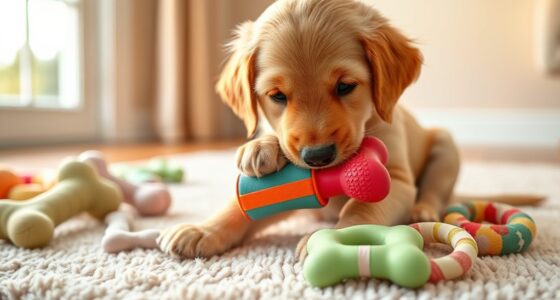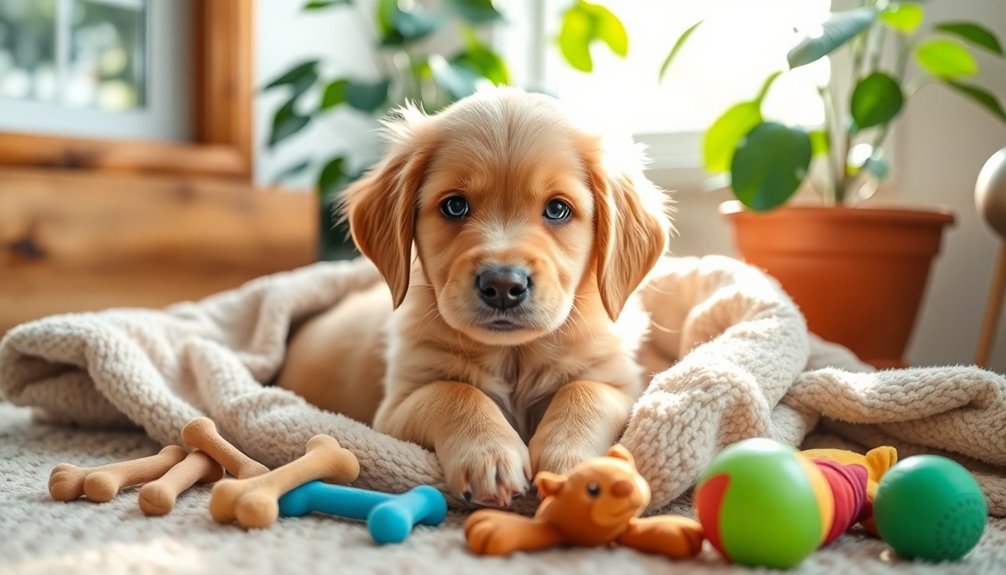To raise a well-behaved puppy, start by praising good behavior and establishing clear rules. Correct unwanted actions through gentle redirection—harsh punishment can create fear. Early socialization is essential, exposing your puppy to diverse environments and people for friendly interactions. Create a positive environment filled with playfulness; it nurtures bonding and keeps training engaging. Finally, consistently use positive reinforcement techniques to reward desired behaviors, ensuring your puppy understands what you expect. Implementing these strategies lays the groundwork for a happy, well-adjusted companion. Stay tuned for more tips to perfect your puppy training approach.
Key Takeaways
- Consistently praise good behavior to reinforce positive actions and encourage your puppy to repeat them.
- Correct unwanted actions through clear communication and redirection without harsh punishment to avoid fear.
- Early socialization with diverse people and environments fosters friendliness and adaptability in your puppy.
- Create a positive training environment with fun activities and light-heartedness to enhance bonding and learning.
- Utilize positive reinforcement techniques, rewarding desired behaviors immediately to clarify expectations and build trust.
Praise the Good Behavior
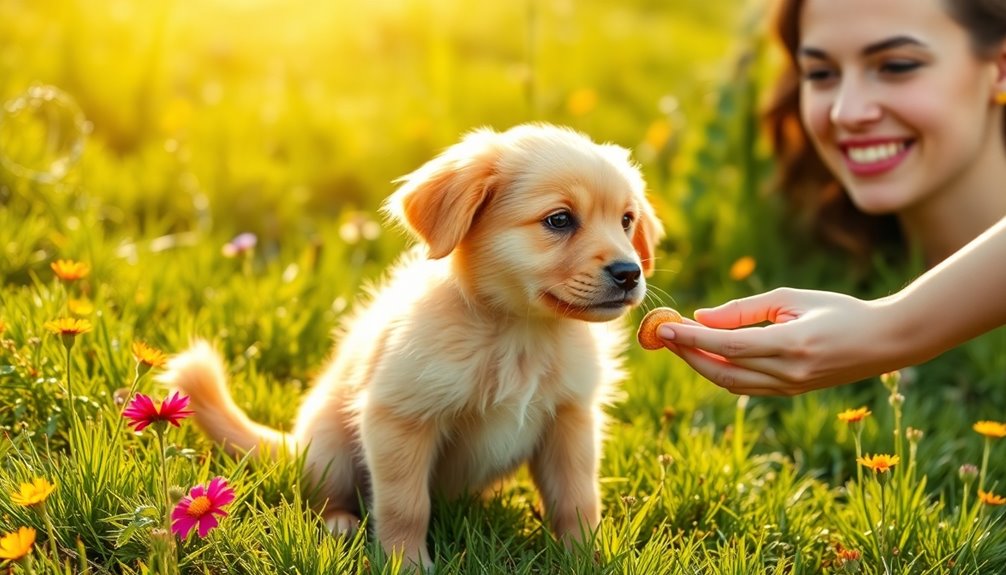
Praise is a powerful tool in shaping your puppy's behavior. When you consistently praise the good behavior, you reinforce those actions and encourage your pup to repeat them. This positive reinforcement is key to effective training, as it helps your dog understand what you expect.
Remember, it's not just the flashy tricks you want to highlight; quiet, non-attention-seeking behaviors are just as important. By acknowledging these moments, you foster a well-behaved dog.
Set clear rules and boundaries so your puppy knows what's acceptable. When your dog meets these expectations, reward them with praise or treats. Studies show that dogs learn faster when they're rewarded, making your praise essential for effective training.
Be mindful, though—praising high energy can inadvertently encourage unwanted behaviors. Instead, focus on rewarding calmness and good manners.
As you praise the good behavior, you'll notice a stronger bond forming between you and your puppy. This trust enhances your training success and creates a positive environment for learning.
Ultimately, consistent praise not only shapes your puppy's behavior but also builds a lasting partnership, ensuring a happy, well-adjusted dog.
Correct the Unwanted Actions
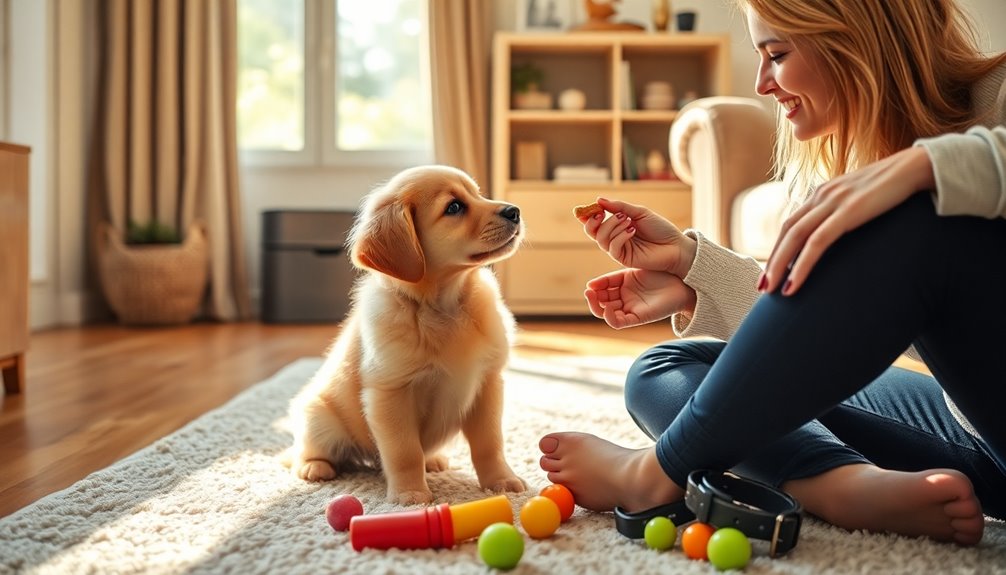
Correcting unwanted actions in your puppy is vital for effective training. You need to use clear communication and redirection strategies instead of harsh punishment. This approach prevents fear or anxiety, allowing your puppy to learn better. Consistent and timely corrections, paired with positive reinforcement for good behavior, help your puppy grasp what's acceptable.
| Unwanted Behavior | Correction Strategy | Positive Reinforcement |
|---|---|---|
| Jumping | Redirect to a sit command | Praise when sitting |
| Chewing | Provide chew toys | Praise for using toys |
| Scavenging | Use baby gates to block areas | Treats for staying away |
Understanding canine communication is essential, especially when your puppy seeks attention. Redirecting their focus helps curb unwanted behaviors effectively. By incorporating gentle corrections and praising desired actions, you'll cultivate a balanced training environment. Remember, early training sets the foundation for your puppy's future behavior. As a dog owner, you're setting your pup up for success by establishing clear boundaries and expectations. With patience and consistency, you can nurture a well-adjusted, obedient companion. Incorporating positive reinforcement can further enhance your training efforts.
Importance of Early Socialization
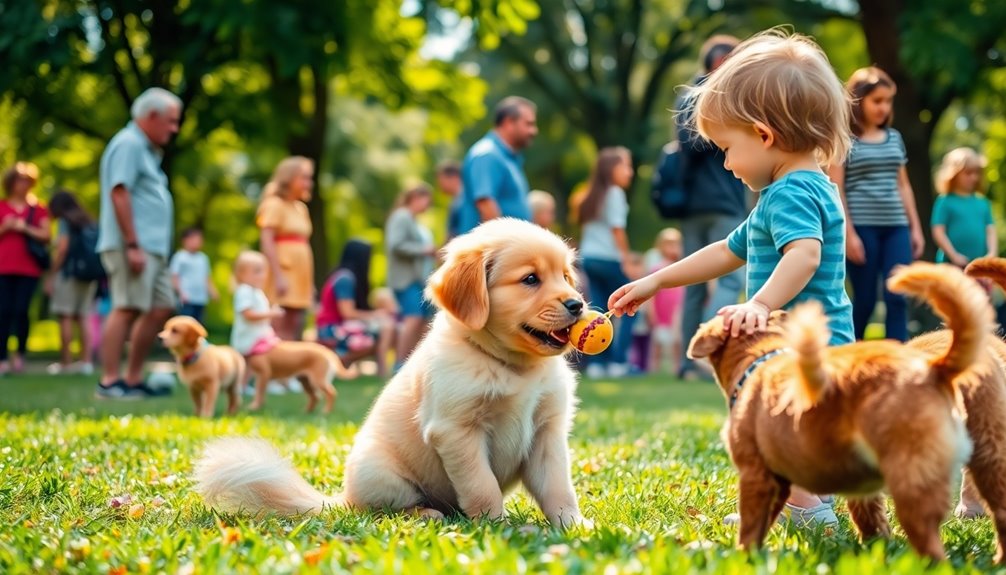
Socialization plays an essential role in your puppy's development, especially in those early months when they're most impressionable. Early socialization is imperative during the first three months of your puppy's life, known as the socialization window. This is the time to expose them to new experiences and environments, helping shape their behavior and personality.
Meeting at least 100 different people by the age of 12 weeks can greatly foster friendliness and help keep future behavioral issues, like fear or aggression, at bay. It's also critical to socialize your puppy with various animals, including cats and farm animals, to promote positive interactions.
Regular exposure to diverse environments, such as pet shops and parks, enhances your puppy's adaptability to new sights and sounds, contributing to their overall confidence.
Using positive reinforcement and consistent training methods during this significant period is essential. A positive approach to socialization guarantees lasting behavioral benefits, creating a well-adjusted dog.
Establish a Positive Environment
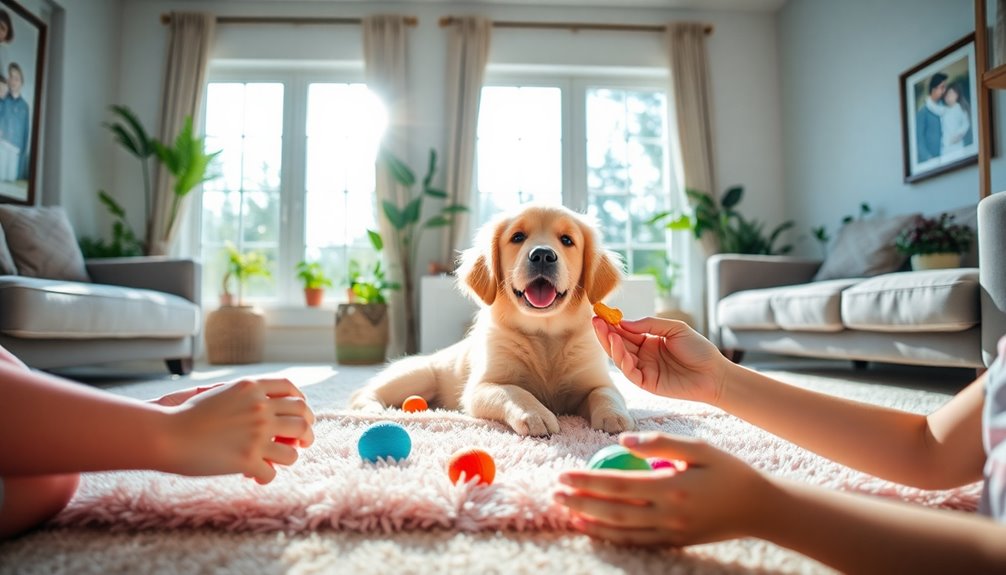
How can you create a positive environment for your puppy during training? Start by fostering a fun and engaging atmosphere that enhances your bond and keeps your new puppy enthusiastic for future training sessions. Incorporate light-hearted attitudes and playtime to maintain their interest and reduce stress.
Puppies thrive when they associate training with enjoyment, so make it a priority. During training sessions, focus on creating enjoyable experiences. Use positive reinforcement, like treats and verbal praise, to encourage good behavior.
This approach not only helps your dog learn faster but also builds trust between you and your puppy. Always aim to end each session on a high note. Whether it's with a fun game or extra praise, leaving on a positive note reinforces what your puppy has learned and guarantees they're excited for the next round.
Use Positive Reinforcement Techniques
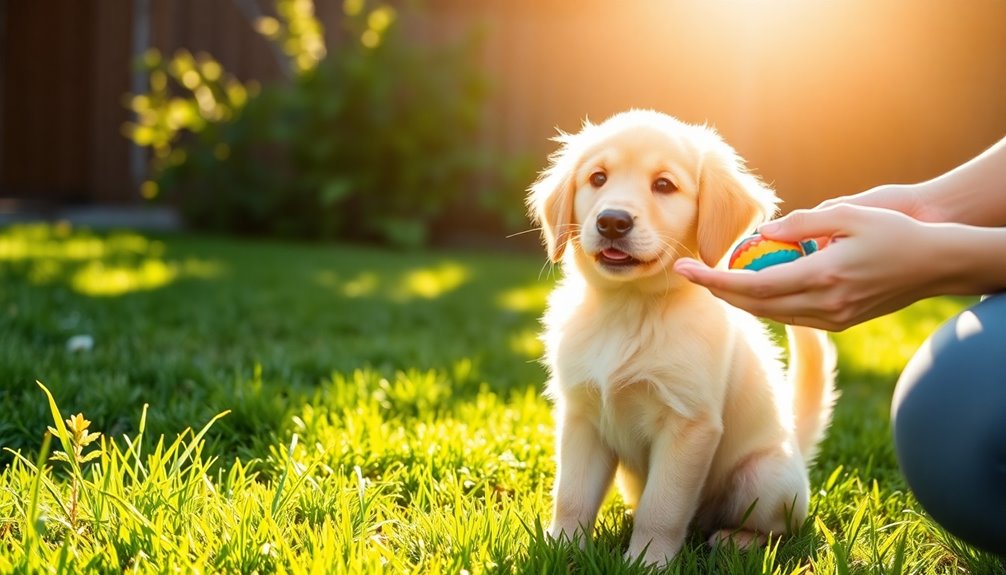
Using positive reinforcement techniques is key to successful puppy training. When you reward your puppy for desired behaviors with treats, praise, or playtime, you're setting the foundation for a happy and obedient companion.
In the first few months of your puppy's life, it's vital to make certain you're consistently reinforcing good behavior. This helps your puppy understand what you expect and encourages them to look forward to training sessions.
Each puppy has unique needs, so pay attention to what motivates yours the most. Whether it's a favorite toy or tasty treats, using positive reinforcement tailored to your puppy's preferences makes learning more enjoyable.
Immediate rewards after good behavior are essential; they help reinforce the desired actions and make your puppy less likely to forget what they've learned.
Avoid punishment-based methods, as they can create fear and anxiety, ultimately hindering your puppy's learning process. Building a relationship based on trust and respect through positive reinforcement will lead to a well-adjusted puppy.
Consistently applying these techniques will guarantee long-term success in training and a well-behaved furry friend.
Frequently Asked Questions
How to Make Your Puppy Well Behaved?
To make your puppy well-behaved, start training and socializing during those essential first three months.
Set clear rules and boundaries, ensuring everyone in your household is consistent.
Use positive reinforcement like treats and praise right after your puppy exhibits the desired behavior.
Make sure your pup gets plenty of exercise and mental stimulation daily.
Finally, consider crate training to create a safe space, aiding in housetraining and promoting calmness.
What Is the Puppy 1/2 Rule?
You've just opened the ultimate potty training hack!
The Puppy 1/2 Rule suggests your puppy can hold their bladder for about one hour for each month of age, plus an extra hour.
So, if your pup's three months old, they can usually wait four hours before needing a break.
Following this rule helps you prevent accidents and establishes a routine that aligns with your puppy's needs, making housetraining much smoother.
What Is the Hardest Stage of Raising a Puppy?
The hardest stage of raising a puppy typically falls between 8 to 16 weeks.
During this critical period, your puppy's high energy and teething can lead to increased chewing and biting.
You'll need to provide plenty of socialization and exposure to different environments to prevent future behavioral problems.
Establishing house rules and using consistent positive reinforcement will help you shape your puppy's habits and manage their energy levels during this challenging time.
How Do You Discipline a Puppy That Won't Listen?
When your puppy won't listen, it's essential to stay calm and patient. Instead of punishment, try using positive reinforcement. Reward good behavior immediately with treats or praise to encourage them.
If they're ignoring commands, redirect their attention to a toy or engage in a fun activity. Consistency is key, so make sure everyone in your household follows the same rules.
If issues persist, consider seeking professional help for tailored strategies.
Conclusion
By following these five secrets, you'll transform your puppy into a well-behaved companion that everyone will envy. Remember, consistency is key; your efforts will pay off in spades! As you praise good behavior and correct unwanted actions, you're not just training a dog—you're shaping a lifelong bond. Embrace early socialization, create a positive environment, and use positive reinforcement techniques. With patience and love, your puppy will become the canine superstar you always dreamed of!

